Overlanding and outdoor shows have seen a tremendous growth of exhibitors as well as attendees, and we are seeing a broader spectrum of people that have taken to the overlanding lifestyle. In recent years, there has been an increase of overlanders and, more notably, the #vanlife movement. Although the pandemic put a damper on exploring the outdoors for a brief moment, it seems that overlanding has taken on a new meaning for many.
Recreational camping in the United States, in particular, has not always been accessible to everybody and most certainly was not always a family affair. In the 1800s, it was conceived to be the reserve of the white-collared male within the upper-class community as a means of escaping his industrialized city life to unwind and return to his primitive state to rough it out in nature. His own Eden, without the worries of his wife or children.
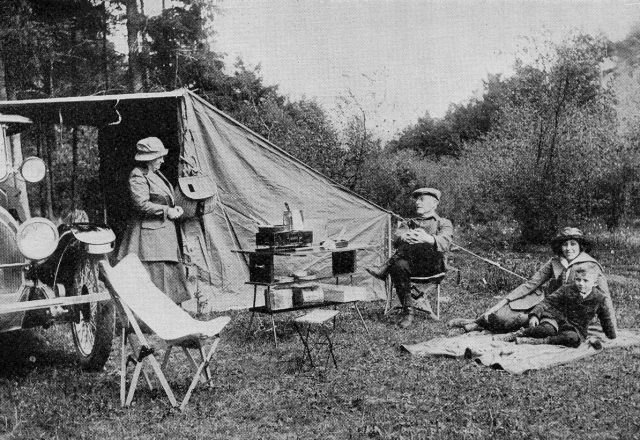
In 1869, when William H.H. Murray (minister and adventurist) explored the Adirondack Mountains in northern New York on a penny-pinching budget, he decided to produce his first book, Camp-Life in the Adirondacks. He advocated that camping could be a family affair within the working class and was surprised by the concept’s popularity; Murray’s work changed the way people perceived camping.
After World War II, leisure time and motorized vehicles made camping more popular and accessible to the general population in the United States. Production of motor camping with trailers or auto-camps began, and more people were exploring the forest lands around the US. However, there was still a lack of diversity in the outdoors.
But with the #DiversifyOutdoors movement and other organizations, people of all races, religions, wealth, and abilities are now enjoying more freedom to explore the outdoors with less discrimination and fear.
We have connected with and interviewed a handful of amazing adventurers that have taken to this new lifestyle against all odds. Wheelchair users are traveling across the PanAm, kayaking their way across the Americas, and trekking the mountain ranges of Nepal. People of color and LGBTQ+ people travel to countries to challenge the status quo by inspiring and opening dialects within communities. Women are traveling solo around the world without fear of the unknown, and we have the opportunity to hear their stories about the connections they make in foreign lands.
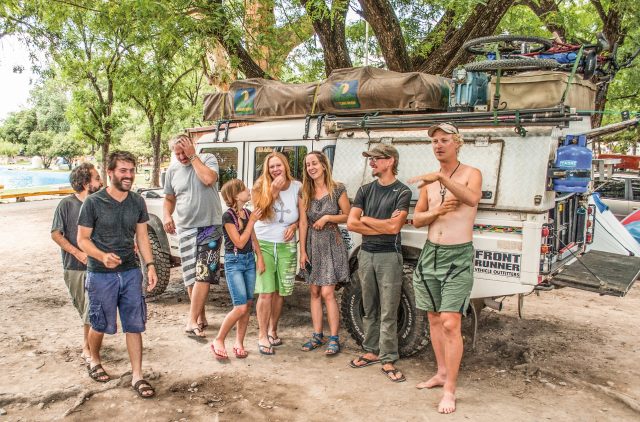
As overlanders, community is essential in order to provide support and a safe space to explore the way of life we choose to live, not just for the few but for everyone.
There are many overlanders that are part of the underserved community, and it is important to highlight these strong, brave, and determined individuals as they make their way across the planet overland, breaking boundaries each step of the way.
“Modern society has perfected the art of making people not feel necessary. It’s time for that to end.”
Sebastian Junger, from his book Tribe.
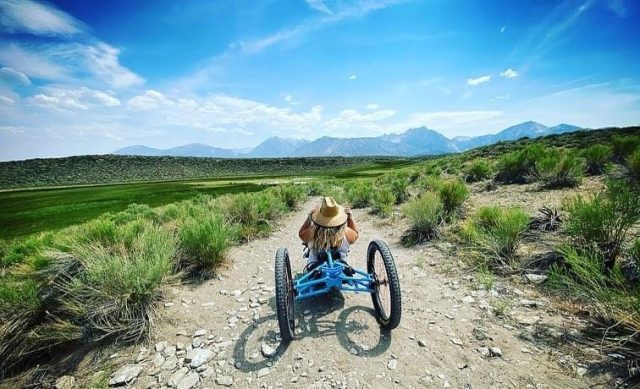
As non-disabled, full-time overland travelers, we experience many difficulties along the way, sometimes so that it seems we are pioneering the way forward. But when you meet Channing, you realize that any challenge can be overcome with the right mindset. Channing Cash was born in Laos and attacked by a bull at the age of three, leaving her with a broken hip and back, paralyzed from the waist down. Her parents spent the following two years caring for her as best as they could in Laos but realized that Channing would require professional medical care and made the arduous journey to the USA. Channing initially struggled to integrate as a child, but with perseverance and her ambitious attitude, she has excelled as a professional paracanoeist and a member of the Team USA Paracanoe team. Channing is an advocate for accessibility to all in the great outdoors. This is her story.
“To say [my accident] changed my life forever is an understatement. I look back, and I could still be living in a third-world country. When something is taken away from you, things like the feeling of water and sand touching your toes now mean the world to you. The water is a magical place for me. It’s a sense of freedom. I no longer look at my disability as a negative thing. It has brought me more opportunities than I could ever ask for. This journey has taught me self-confidence and that life can be wheelie awesome again and a blessing in disguise.”
– Channing Cash
Tell us about yourself
I am a spinal cord injury survivor from a bull attack when I was younger. [That incident] left me paralyzed, and I now use a wheelchair to get around. We relocated to the US from Laos when I was five years old as I needed medical assistance. It was a difficult transition as I wasn’t just dealing with a disability but dealing with a new culture in a foreign country. Fast forward, and I am a former team USA adaptive athlete representing Sprint Kayaking and an advocate for outdoors for all abilities inclusion, showing the world life is way better active.
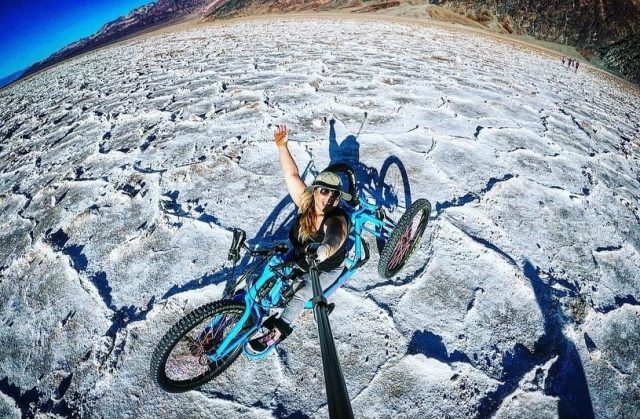
What motivates and inspires you?
People have been telling me [what I could and couldn’t do] because of my disability all my life. Hearing that repeatedly motivates me never to give up and go for it. I welcome failure with open arms. Without failure, I cannot succeed.
After a 2015 trip to California from your home state of Illinois, you signed up to be part of Team USA Adaptive Athlete for Sprint Kayaking. Tell us more about this.
When I first started. I was looking for outdoor recreation to get fit and healthy. I had no idea it was going to lead me to Team USA. I spent three seasons with Team USA. I won my first major medal at my first international race in Nova Scotia and took second place. We constantly traveled and spent a lot of time on the road, traveling to competitions worldwide.
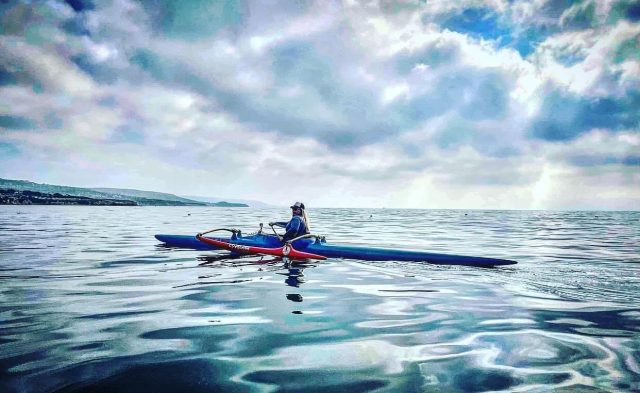
You recently decided to pursue a more outdoor lifestyle and go overland with your truck. When did you decide this was to be your future?
I got a truck because I needed something that could haul my boat for training. Every season, we attend training all over the US. I felt a small Tacoma pickup truck would be the perfect fit to transport my boat and gear and keep down the costs of staying in hotels; I would sleep in my truck instead. I realized that being on the road gave me independence, allowing me to explore beautiful parts of America. I began departing a few days earlier for the training camps to take detours to national parks and explore. It was my outdoor therapy. And I love every minute of it. Maybe I am passionate about it because so many people advised me that wheelchairs and the outdoors don’t mix. And I could never go camping solo. That is how my overlanding soul got created.
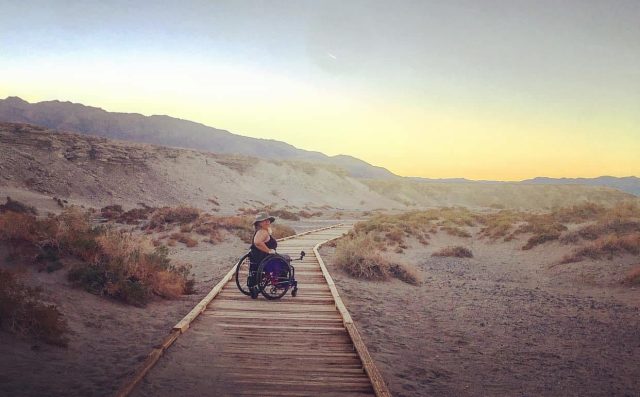
What is your life philosophy?
Never give up, and don’t let others write your happily ever after. No one knows your abilities and situation better than you.
How many countries have you traveled to, and what are your favorite overland destinations so far?
I think five or so countries, but overall I still love the US. So far, my favorite destination is Alabama Hills. Alabama Hills has this Mobius Arch hike. There are a lot of boulders there, and I had no idea I was even capable of doing that hike. Somehow I have an obsession with natural arches. Maybe because it’s challenging for people in wheelchairs, and I like a challenge. I successfully completed that hike and made it to the top of the arch, and it was my very first arch hike. That is probably why I love that place. It reminds me of Mars—very unreal.
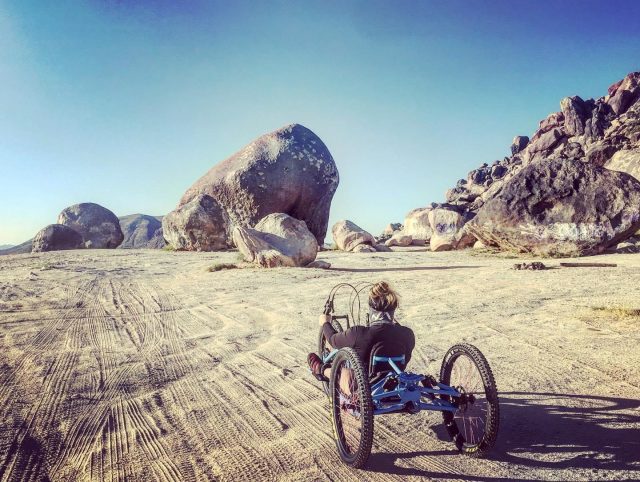
How has traveling changed you?
Oh my gosh, where do I start? You realize that you can live out of a duffel bag. You become a minimalist. I live in Southern California, and it can get very overwhelming with people and the traffic. So when I am traveling, I feel a sense of freedom. And it makes you realize how much water you were using and the electricity you were using because when you are on the road, you only can carry so much water, and your solar panel can only provide you with so much power. You are way more conscious of how much you use. And traveling and seeing the world is a beautiful thing.
How do you afford to travel?
I take on different types of projects. I have done speaking engagements and projects with national parks and even in the filming/media industry. I only take on jobs I genuinely love, so it doesn’t really feel like a job.
Travel dreams and goals?
There are a lot of places I want to see still. One of my goals this year is to take on the Delicate Arch in Utah. And someday, I would like to create a nonprofit to help people get outdoors regardless of their abilities. I would like to see all abilities in outdoor inclusions.
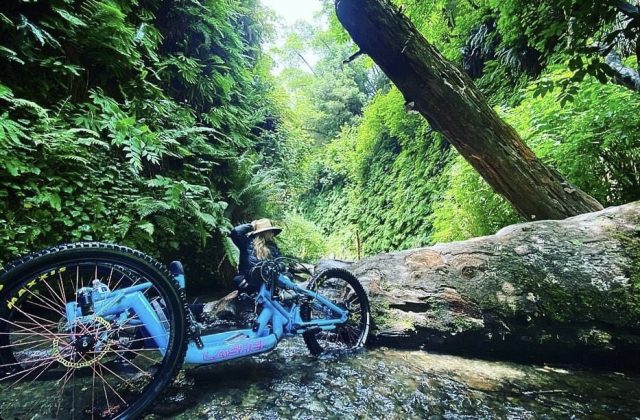
What challenges do you face on a day-to-day basis?
I think what I hate the most is getting my wheelchair in and out of my truck. It’s like a jigsaw puzzle; you have to fit it in a certain way so you can take it out successfully.
What equipment do you travel with?
When you live in a situation where your legs are not working, you have to get creative on how you can achieve outdoor exploring.
A handcycle has mountain tires to handle slick rocks and more rugged terrain. And I recently added a motor, which definitely saves my arms when I am on a climb.
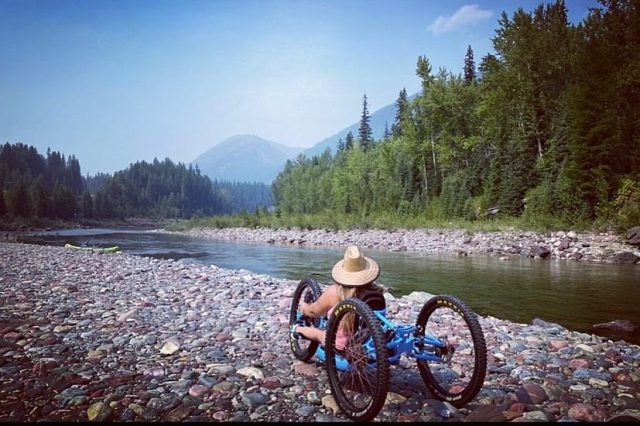
My wheelchair has more aggressive knobby tires to help me not sink into soft or loose dirt when I am camping.
Beach Trax is a hard pathway that I lay over rocks or sand when I want to get to waterways to go paddleboarding. So it’s almost like a portable sidewalk for me to wheel on.
Are there any community resources that you rely on?
I use Campendium a lot for guidance on where to park. I also research on YouTube so that I can visually see what type of terrain I will be challenged with so that I can be prepared.
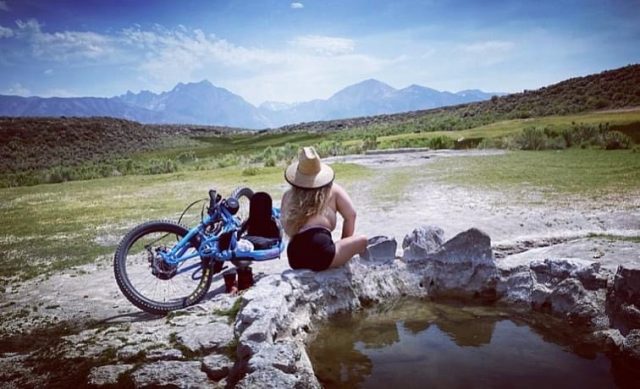
Are there any organizations that you support or promote while traveling?
Oh, yes! There are a lot of adaptive outdoors foundations all over that assist people with disabilities in discovering the great outdoors. To name a few…
Life Rolls On – surfing
Wydaho – mountain biking with camping
Project Airtime – paragliding
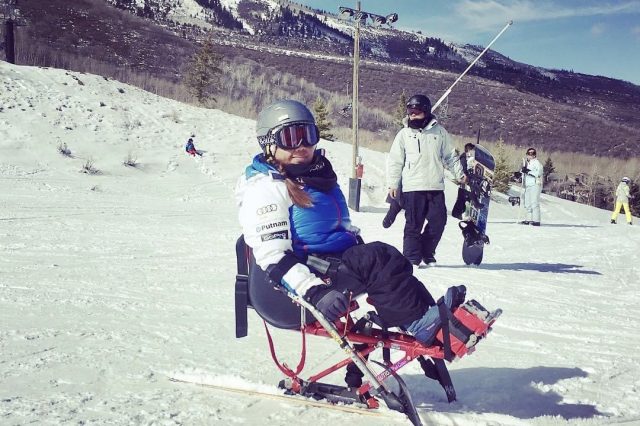
You keep pushing yourself to new limits by making adventurous trips. What advice or guidance can you give other wheelchair users to motivate them to do the same?
Do not allow other people’s opinions to tell you [what is and is not possible]. After a while, you start believing it. Nobody knows your ability more than you. And you have every right to explore the great outdoors.
Do you have any advice for those who dream of living a life of adventure but feel that the challenges they may face are insurmountable?
If you don’t do it, you’ll never know. You only live once. Why not go for it?
Mode of Transport
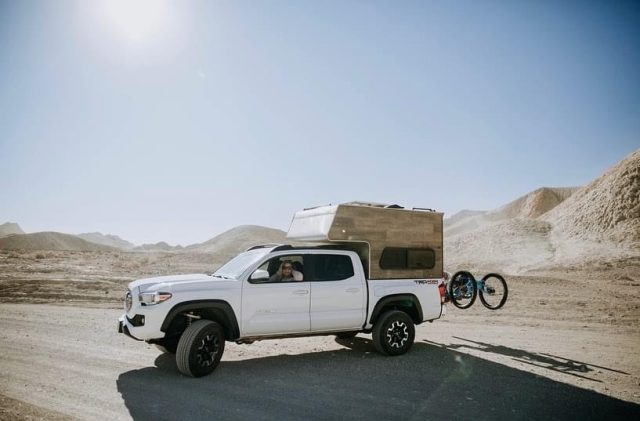
Tell us about your vehicle and the modifications made for your adventure gear and equipment
- Toyota Tacoma 4×4 TRD Offroad
- DIY homemade wood box camper with a guest bunk. The top has a foldout platform that opens up to 5 feet deep, and if you sleep diagonal, it can fit 6 feet
- I have solar panels on the roof and a deep-cycle battery to operate my lights and fan
- Jackery lithium 1000 with foldable 100-watt panel
- Dometic fridge
- Mr. Heater Buddy
- Propane tank for my Camp Chef stove, 11 pounds
- Hand controls for my driving
- Fox suspension
- Timbren bump stop
- 33-inch tires
- MX hauler to carry my off-road lasher handcycle even though it’s made for a dirt bike
- Kuat swing-away hitch, so I don’t have to unload/load my bike every time I need to get into my camper.
Mileage? 133,000
Fuel consumption? 16-17 mpg
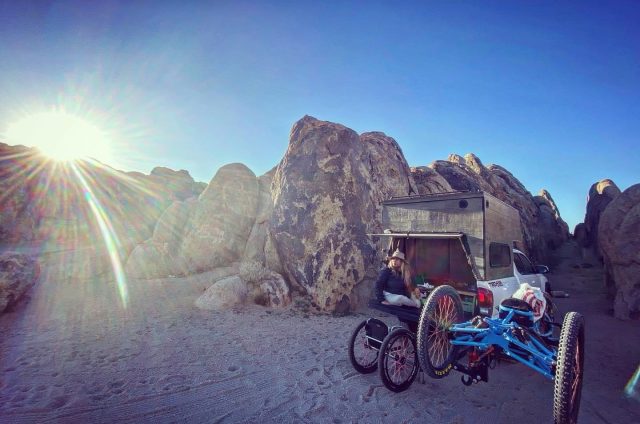
Any specific gear you travel with?
Always my handcycle, so I can explore and hike places my wheelchair isn’t capable of.
Anything more you would like to add?
I started my social media [campaign] not because I wanted to be famous, but [because] I was that little girl that was told the outdoors wasn’t within my reach. I didn’t have a role model of someone in a wheelchair doing something cool, [showing me] it was possible. My mission is to inspire ALL ABILITIES to not settle on what society tells us. Keep chasing your dreams even if it seems impossible.
Regrets?
I didn’t start this truck life sooner.
Social media:
YouTube: AllAbilitiesOverland
Our No Compromise Clause: We carefully screen all contributors to ensure they are independent and impartial. We never have and never will accept advertorial, and we do not allow advertising to influence our product or destination reviews


